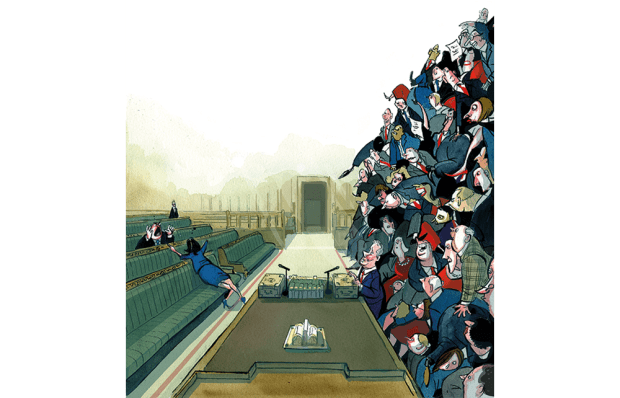Take care
Sir: Your editorial (‘Counting the costs’, 8 January) makes valid points regarding the funding of social care. The good people of the north in the red-wall seats will be rightly appalled. A couple who have worked hard and made their own way onto the property ladder must wonder what they have voted for. They sit on a property worth £100,000 to £200,000. If they need a care home, they will see their children’s legacy disappear into the hole of care costs while knowing that they are subsidising the same care costs of millionaires. This is deeply unfair and, I daresay, anti-Conservative. There should be no care costs on a modest legacy of, say, less than £250,000. This will ensure people are not disadvantaged in the ‘levelling up’ agenda and feel they are treated fairly and the care costs are more fairly distributed. Otherwise I believe those loaned red-wall seats will return red.
Joe Hanson
Preston, Lancs
Following the science
Sir: I found myself nodding in agreement to the articles by Kate Andrews, Philip Thomas, Rod Liddle and Douglas Murray last week (8 January), as they called for a more measured response to Covid. What I have found most baffling about the approach of our government and public health officials has been the constant appeal to science and data as a basis for policy-making, but the simultaneous application of policy that fails to reflect what we know about the virus. Some failures to ‘follow the science’ include Sage’s modelling; the reasoning for vaccine passports (though they provide no known reduction in transmission or vaccine hesitancy); incongruous lockdown rules. In almost any other area of work, such failure would be called up immediately: instead they trundle on and therefore so must we.
In reality, well-applied science and public policy (the vaccination programme, for example) have done much to get us through this pandemic, but policy requires a trusting and supportive public. I just hope the experts don’t push their public too far.
Ben Reavley
Brixton, London
Bring on the illegal raves
Sir: Vaccine passports don’t ‘risk deepening divisions’; they guarantee them (‘A pretty pass’, 8 January). Three easy jabs meant I could show my virtual papers and enjoy a hedonistic night in Exeter before Christmas. The escapist pleasure was short-lived, but the quisling’s guilt still haunts me. Now, if society is to be divided between the acquiescent and the rest, clearly all those with any kind of spine will shun compliance. Furthermore, the prospect of illegal, passport-free dances, happening under the radar and promoted only by word-of-mouth, fills me with delicious anticipation.
Nick Allison
Okehampton, Devon
Back to the Bible
Sir: Theo Hobson seems to miss the bigger picture when asserting that Anglicans need to agree to disagree (‘Divided, we stand’, 8 January). In his article I counted only three references to ‘God’ and precisely zero to either ‘the Bible’ or ‘Jesus’. If Christians were to focus on these elementary things, perhaps there would be no need to disagree. I’m not convinced that every parish having an ‘extrovert creative wing’ is as effective a strategy as simply going back to basics. He condones the ‘simplistic idea of mission’ backed by evangelicals, while acknowledging that it appears rather popular: perhaps there is a reason for this!
James Worringer
London W6
Hungry for meaning
Sir: I enjoyed Theo Hobson’s thoughtful article on the Church of England. I suggest that vital to the Church rediscovering its contemporary confidence is its ability to teach and share the riches of Christian spirituality in a way which is both attractive and accessible. People are as hungry for meaning as ever, but the Church does not always lead people into the depths of its own tradition.
The Revd Ben Brown
Lewes, East Sussex
Hungry for Fray Bentos
Sir: That Jeremy Clarke compares food at his decent local French restaurant with a well-known pie in a circular tin (Low life, 8 January) is most comforting to those of us who absolutely adore Fray Bentos pies. Jeremy will of course know that the Fray Bentos steak and kidney pie boasts all of 11 per cent beef and 10 per cent pork kidney. Who cares what the other ingredients might be when faced with such a delicious meal?
Gavin Marriott
Lower Froyle, Hampshire
Cracking the Cnut
Sir: Martin Vander Weyer’s reference to the Bank of England’s ‘Cnut-like posturing’ does Cnut a disservice (Any other business, 8 January). Steadfast in adversity and magnanimous in victory, Cnut did not suffer fools gladly. To his sycophantic courtiers, who fawned over him with their claims of his omnipotence, he declared: ‘Every being in the world is feeble and impotent. Omnipotence exists in God in whose hands are all the elements of nature.’ The demonstration of this was the famous call for the tide to go back. The soaking that followed was Cnut’s own prediction.
T. Hetherton
Meltonby, York
Strong backlash
Sir: Dot Wordsworth (Mind your language, 8 January) missed out the major source of ‘backlash’; namely the springing back of a ship’s towline if it snaps. For example, to quote the Annapolis Book of Seamanship: Fourth Edition: ‘The towline must be led through a chock at the stem, using split hose, rags, or other chafing gear… If it snaps, the backlash could break your leg.’
Ken Stevens
Sonning Common, South Oxfordshire
Write to us: letters@spectator.co.uk
Got something to add? Join the discussion and comment below.
Get 10 issues for just $10
Subscribe to The Spectator Australia today for the next 10 magazine issues, plus full online access, for just $10.
You might disagree with half of it, but you’ll enjoy reading all of it. Try your first month for free, then just $2 a week for the remainder of your first year.














Comments
Don't miss out
Join the conversation with other Spectator Australia readers. Subscribe to leave a comment.
SUBSCRIBEAlready a subscriber? Log in